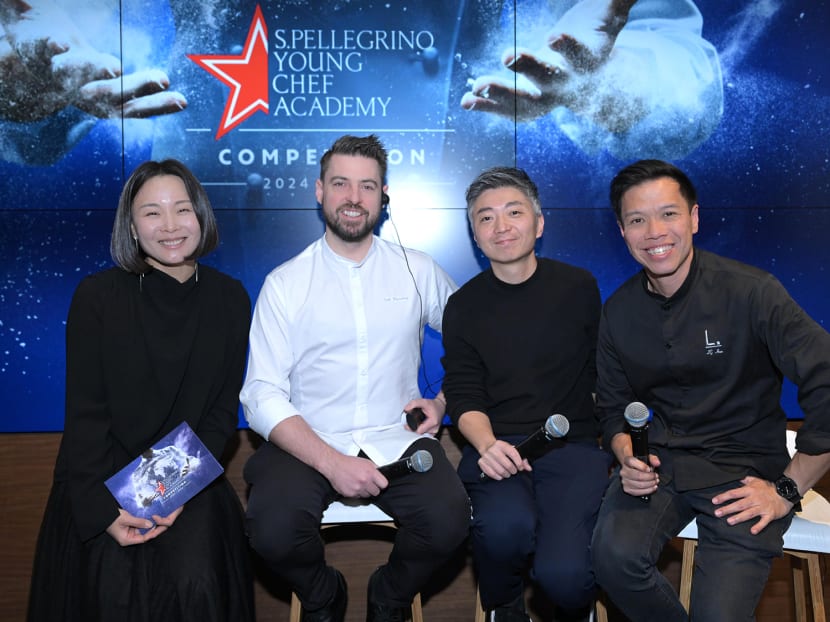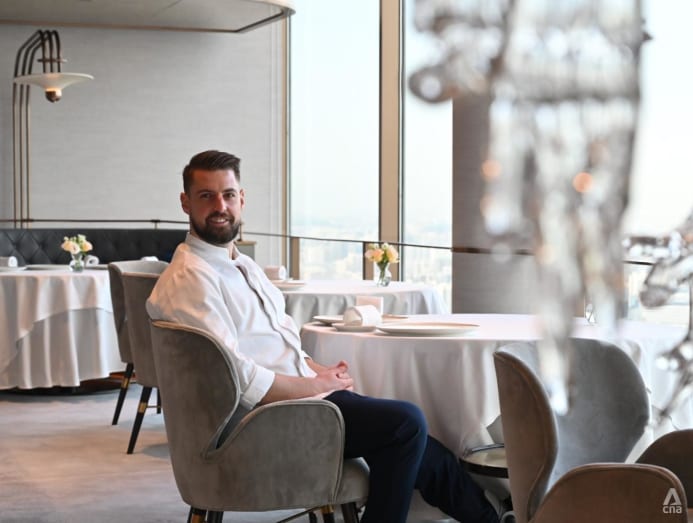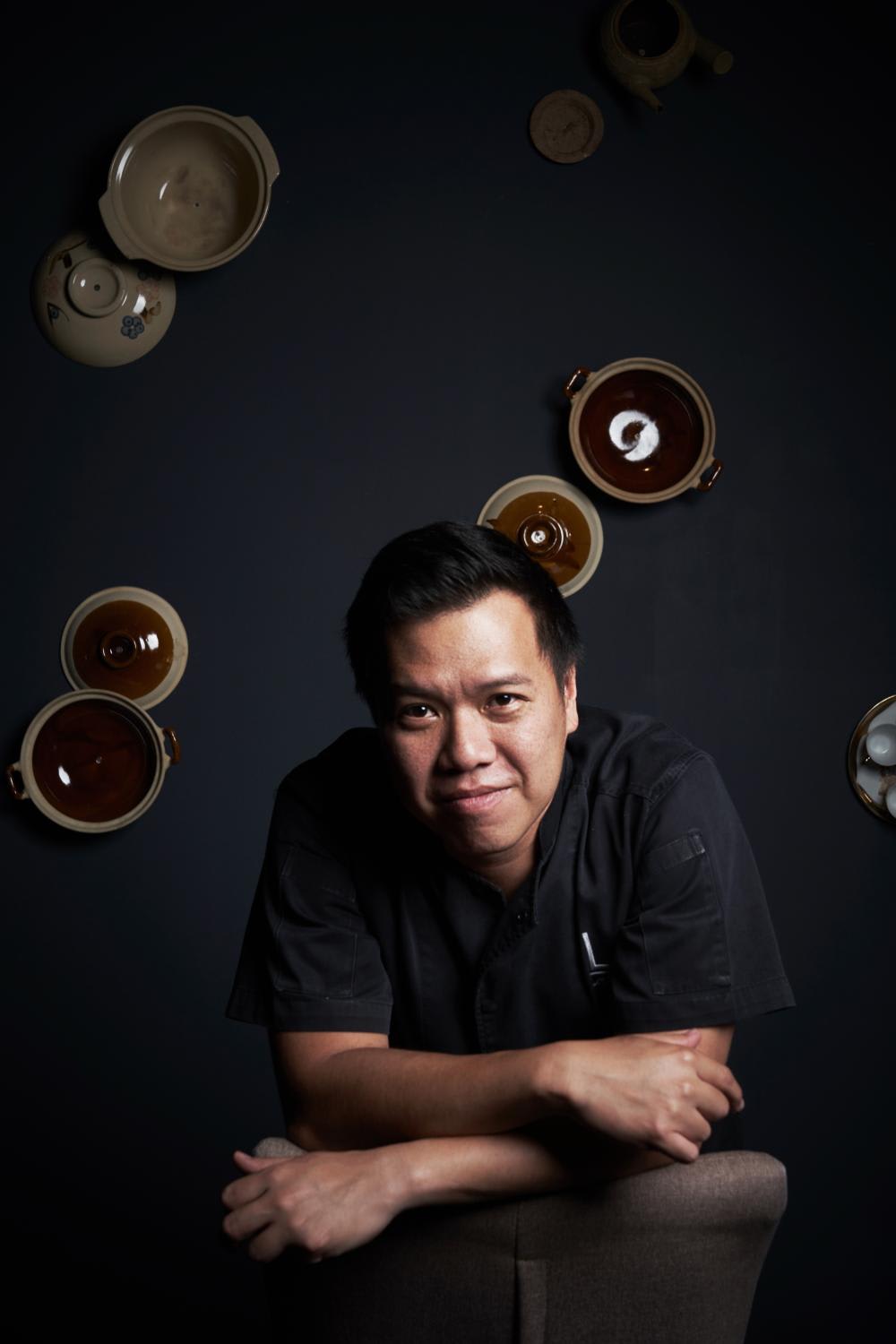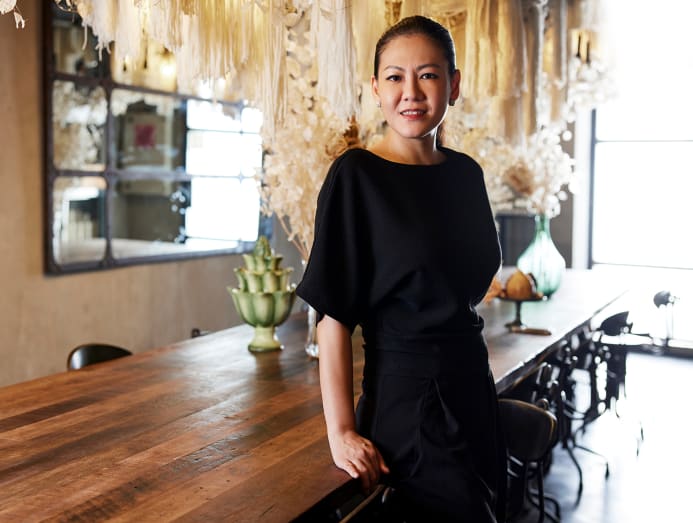Why contests like the S Pellegrino Young Chef Academy Competition are important for young chefs today
Cook what you love, get ready to fail and don’t follow trends. These nuggets of wisdom and more are all part of the mentorship provided in the S Pellegrino Young Chef Academy Competition.

S Pellegrino Young Chef Academy media luncheon panel discussion. From left: Moderator Summer Lee and chefs Kirk Westaway, Richie Lin and LG Han. (Photo: SPYCA)

This audio is generated by an AI tool.
Food trends and social media popularity may fluctuate like the volatile stock market; but the fundamentals of being a good chef never change.
This was the unanimous advice shared by mentors and jurors in the S Pellegrino Young Chef Academy Competition (SPYCA) 2024/2025 as they gathered in Seoul last month (Mar 24) with the Asian regional finalists in a themed luncheon called Bring Your Future to the Table. Besides a multi-course lunch presented by chefs and finalists from Singapore, Seoul and Hong Kong, there were several panel discussions on the future of Asia’s culinary landscape.
Speaking to CNA Luxury on the sidelines, Kirk Westaway, chef-owner of two Michelin-starred Jaan by Kirk Westaway, said that the one thing he’d have told his younger self when he became the inaugural Southeast Asian winner in 2015, it would be this: Cook what you believe in.

That year, he became the executive chef of Jaan, which was previously French leaning. He reflected: “There was a lot of pressure to be incredible immediately. For the first couple of years, I was trying to be respected and appreciated by delivering the ingredients I felt people wanted. It was still my food, but I was putting wagyu, caviar, white truffles… and as I progressed, I realised this wasn’t my style.”
He recognised that the only way to be appreciated as a chef was to cook what he wanted — comforting, modern British food. He also learnt that failure is essential and that one doesn’t have to listen to every advice and opinion given by other people.

LG Han, chef-owner of one Michelin-starred modern Singaporean restaurant Labyrinth and a Regional Mentor, agreed. He said: “Don't be driven by trends and you don’t have to incorporate [ingredients] for the sake of doing it if it is not your personal belief. Your food can be casual, fancy, anything. Just put yourself on the plate and cook with your heart.”
Johanne Siy, an Asia Regional Juror and owner of Lolla, acknowledged that chefs are grappling with higher expectations in running a restaurant today than a decade ago. She shared: “It’s not enough to be able to cook; you’ve to build a network and communicate well with people. I feel a lot for these up-and-coming chefs: Who can they look up to?”

For that reason, she often encourages young chefs to join competitions like SPYCA where they can interact with more experienced chefs. She explained: “You get real-time feedback, and you don’t have to reinvent the wheel.”
While social media has become a key driver in the popularity stakes, Richie Lin, an Asia Regional Juror and chef-owner of Taipei’s Mume restaurant, cautioned young chefs against an obsession with visuals or storytelling. “I see a lot of younger chefs spending too much time on storytelling, finding ideas and following trends rather than working on their culinary technique. You still need the fundamentals of good cooking; the aesthetic part can come later.”
For Han, plating a hot dish so long that it turns cold is a big no-no. He emphasised: “It doesn’t matter how beautiful it is, if it’s not cooked right, people will not go back to your restaurant.”
Launched in 2015, the S Pellegrino Young Chef Academy Competition is open to chefs aged 18 to 30 years, who must apply in the following languages: English, Chinese Mandarin, Spanish, French, German or Italian. This year, 15 grand finalists from markets such as Central Europe, Italy, France, mainland China and Africa, Middle East and South Asia will be competing in the grand finals in Milan in October.
Participants get to go on cultural exchanges and internships, where they work alongside senior chefs and glean an insider perspective into a restaurant’s operations. Following his global win in the 2022/2023 edition, Portuguese chef Nelson Freitas spent time with chef-owners Virgilio Martinez and Pia Leon of Lima’s Central, the World’s Best Restaurant 2023. The couple taught him how to manage front and back of house, gave tips on maintaining work-life balance and introduced him to Peruvian producers.
Asia’s regional winner Ardy Ferguson is being mentored by chef Vicky Lau of Hong Kong’s two Michelin-starred Tate Dining Room for the grand finals. The Indonesian-Canadian, who is sous chef at modern French restaurant Belon in Hong Kong, shared that the competition inspired him to delve deep into his Indonesian heritage, hence his competition dish of nasi tumpeng, a traditional Javanese plate of cone-shaped rice, meat and vegetables.
He added that input from his regional finals mentor, Belon’s head chef Matthew Kirkley, and interaction with other talented young chefs also “helped me to develop significantly, which I didn’t expect to do so in such a short amount of time.”
He said: “I was also very thankful that Kirkley allowed me to make my own mistakes. It gave me the freedom to truly explore and create something I was personally very happy with.”
Besides the competition, SPYCA, which has over 3,000 members, also organises online workshops and public events as well as create educational content to engage the wider culinary community on current issues.
San Pellegrino’s Asia Pacific Zone Director Roberto Caroni said: “At SPYCA, we’re constantly evolving to stay relevant to the challenges young chefs face today. Sustainability, for example, is an area we've explored before — and it's one we plan to dive deeper into moving forward. It’s a pressing issue that continues to shape the way we source, cook, and think about food, and we see real value in helping young chefs understand how they can make a difference.”








